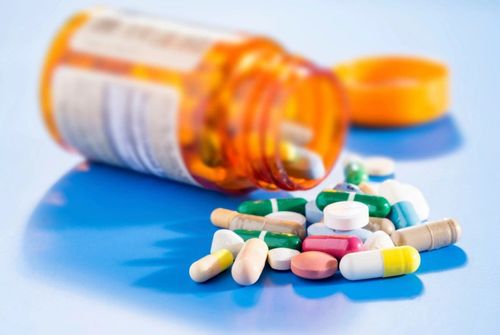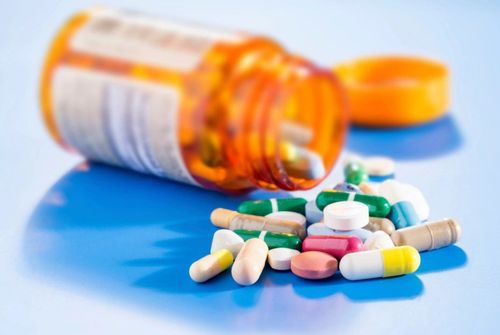This is an automatically translated article.
The drug Bifradin has the active ingredient Cephradine and other excipients in a sufficient amount. This is a first-generation cephalosporin antibiotic, used in the treatment of skin infections, respiratory infections and urinary tract infections.
1. What is Bifradin?
What is Bifradin? The drug Bifradin has the active ingredient Cephradine and other excipients in a sufficient amount. This is a first-generation cephalosporin antibiotic, used in the treatment of skin infections, respiratory infections and urinary tract infections.
Bifradin is made in the form of capsules, suitable for direct oral use.
1.1. Pharmacodynamics of active ingredient Cephradine Active ingredient Cephradine is a first-generation Cephalosporin antibiotic.
1.2. Pharmacokinetics of the active ingredient Cephradine Absorption: Active Cephradine is stable in acidic environments and is almost completely absorbed from the gastrointestinal tract. Distribution: Approximately 6-20% of the active substance Cephradine is bound to plasma proteins. The drug is widely distributed in tissues and fluids, but little into the cerebrospinal fluid. The drug crosses the placenta and the fetal circulatory system and is excreted in small amounts into breast milk. Metabolism: Cephradine is almost not metabolized in the body. Elimination: Approximately 60-90% or more of an oral dose is excreted within 6 hours in subjects with normal renal function. 1.3. The action of the active ingredient Cephradine Main active ingredient Cephradine is a semi-synthetic Cephalosporin antibiotic. The drug has a bactericidal effect by inhibiting the synthesis of mucopeptides in the bacterial cell wall. Cephradine is active against many gram-positive bacteria including penicillinase-secreting or non-penicillinase-producing Staphylococcus aureus, group A beta-hemolytic Streptococcus, group B Streptococcus and Streptococcus pneumoniae. Cephradine has limited activity against gram-negative bacteria, although some strains of Escherichia coli, Klebsiella pneumoniae, Proteus mirabilis and shigella can be inhibited in vitro by these drugs. The active ingredient Cephradine is not effective against bacteria such as Enterococcus, methicillin-resistant Staphylococcus, Bacteroides fragilis...
2. Effects of Bifradin
Bifradin is used to treat infections on sensitive bacteria, specifically as follows:
Treatment of infections on the skin and skin structure. Treatment of respiratory tract infections including lobular pneumonia caused by susceptible Gram-positive cocci. Treatment of urinary tract infections including prostatitis and many other serious, chronic infections.
3. Usage and dosage of Bifradin
Usage and dosage of Bifradin as follows:
3.1. How to use Bifradin Drug Bifradin is prepared in the form of hard capsules, suitable for oral use. Patients should strictly follow the doctor's instructions, absolutely do not change the dose of the drug on their own.
3.2. Dosage of Bifradin For adults:
Dosage for skin and skin structure infections, respiratory tract infections (except hydropneumonia), uncomplicated urinary tract infections: 500mg x 2 times /day Dosage for severe urinary tract infections including prostatitis and lobar pneumonia: 500mg x 4 times/day or 1g x 2 times/day. For children:
Dosage for children over 9 months old: 25-50mg/kg/day, divided into 2 to 4 times. Dosage for treatment of otitis media caused by Influenzae 75-100mg/kg/day, divided into 2 to 4 times, maximum 4g/day. Renal failure: reduce the therapeutic dose according to ClCr.
3.3. Notes on therapeutic doses of the drug Dosages as high as 300 mg/kg body weight have been used in critically ill young children without significant adverse reactions. Maximum dosage for children: not more than 8 g/day. For patients with renal failure, the dose must be reduced with a starting dose of 750 mg and a maintenance dose of 500 mg. The dosing interval is based on creatinine clearance.
4. Undesirable effects of the drug Bifradin
During the use of Bifradin, users may encounter the following side effects:
Digestive disorders, enteritis, Lyell's syndrome, changes in hematologic indices, increased liver enzymes, changes in function kidney function, pneumonia, superinfection, vitamin K and vitamin B deficiency. Headache, dizziness, fatigue, hallucinations. You need to actively stop using the drug when the body shows a hypersensitivity reaction. At the same time, you need to proactively contact your treating doctor for appropriate treatment.
5. Bifradin drug interactions
If you use Bifradin with oral probenecid, it will competitively inhibit the secretion of most of the cephalosporins in the renal tubules, increasing and prolonging the concentration of active cephalosporins in the serum.
At the same time, you also need to be careful in carefully listing with your treating doctor or pharmacist the medicines you are taking. Such drugs include prescription and over-the-counter drugs, oral or topical medications, health foods, vitamins and other minerals...
6. Some notes when using Bifradin
During the use of Bifradin, patients should pay attention to the following issues:
6.1. Contraindications of the drug Bifradin Bifradin is contraindicated or not used in cases of allergy or hypersensitivity to the active ingredient Cefradin.
6.2. Precautions when using Bifradin You need to pay attention when using Bifradin for the following patients:
People with sensitive or hypersensitivity to Penicillin, Cephalosporin. People with allergies. In patients with renal failure, the dose may need to be reduced. You need to actively monitor kidney function and blood during treatment, especially when using this drug for a long time, in high doses. 6.3. How to store Bifradin Keep Bifradin in the manufacturer's packaging. Suitable temperature is about 20 to 25 degrees Celsius, avoid direct sunlight. Do not store this medicine in places with high humidity, especially the bathroom. Keep medication out of reach of children and pets. Medicines that have expired should be disposed of according to regulations. Do not dispose of medication in the toilet, toilet, sink or drain, unless you are instructed to do so. Above is all information about Bifradin drug, patients need to carefully read the instructions for use, consult a doctor / pharmacist before using. Absolutely do not arbitrarily buy Bifradin medicine to treat the disease at home. Because it is possible to encounter unwanted side effects that negatively affect your health.
Please dial HOTLINE for more information or register for an appointment HERE. Download MyVinmec app to make appointments faster and to manage your bookings easily.













